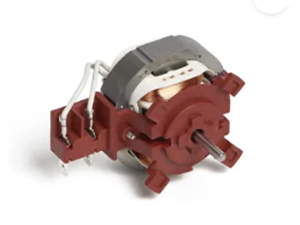Electric Motors
29 November 2023
Electric motors are devices that convert electrical energy into mechanical energy.
 They play a crucial role in various applications, from powering household appliances to driving industrial machinery. There are several types of electric motors, each designed for specific purposes. Here are some key aspects of electric motors:
They play a crucial role in various applications, from powering household appliances to driving industrial machinery. There are several types of electric motors, each designed for specific purposes. Here are some key aspects of electric motors:Basic Components
Stator: The stationary part of the motor that produces a magnetic field when a current passes through it.
Rotor (Armature): The rotating part of the motor that experiences a force due to the interaction with the magnetic field, causing it to turn.
Windings: Coils of wire that carry the current and produce the magnetic fields in the stator and rotor.
Types of Electric Motors
DC Motors:
Brushed DC Motors: These have a rotor with a commutator and brushes that help in reversing the current direction, allowing the rotor to keep turning.
Brushless DC Motors (BLDC): These motors use electronic commutation instead of brushes, making them more reliable and efficient.
AC Motors:
Induction Motors: These are the most common type of AC motors. They work based on electromagnetic induction, where the rotor is not directly connected to the power supply.
Synchronous Motors: These motors operate at a fixed speed and are synchronized with the frequency of the AC power supply.
Stepper Motors:
These motors move in discrete steps, making them suitable for applications where precise control of rotation is required, such as in robotics and CNC machines.
Linear Motors:
Instead of producing rotational motion, linear motors generate linear or translational motion.
Applications
Industrial Machinery: used to power a wide range of industrial equipment, from conveyor belts to pumps and compressors.
Transportation: Electric motors are used in electric vehicles (EVs), trains, and various forms of public transportation.
Household Appliances: found in everyday appliances like washing machines, refrigerators, fans, and air conditioners.
Renewable Energy: motors are used in wind turbines and hydropower generators to convert mechanical energy into electrical energy.
Robotics: play a critical role in the movement of robotic systems, providing precision and control.
Aerospace: they are used in various aircraft systems, including landing gear, flaps, and auxiliary power units.
Efficiency and Environmental Impact
Electric motors are generally more efficient than their internal combustion engine counterparts, especially when it comes to converting energy from the power source to mechanical output. This efficiency, along with the potential use of renewable energy sources, contributes to the environmental benefits of electric motors, particularly in the context of electric vehicles and other clean energy applications.
Everel Electric Motors
Alan Butcher Components represents the Everel Group within the UK. Everel produces the GIEM brand of small electric motors and ventilation fans used within domestic appliances, pumps and HVAC equipment. Founded in 1968, GIEM is widely respected within this arena. The brand is now manufactured in Everel’s production plant in Lipova, Romania. Their EC brushless motors allow maximum speed control and the possibility of reversing rotation. Compared to standard motors, they are up to 70% more efficient.
Key Products
Shaded pole motors & Brushless EC motors –Shaded pole electric motor
Ventilation Units – set of fan, motors and electrical resistors
Other Press Releases By This Company
- 11/10/2024 - Magnetic Float Switch
- 03/09/2024 - Spark Proof Switches
- 05/08/2024 - Our European Suppliers
- 03/07/2024 - Panel Indicator Lights
- 10/06/2024 - Berker Wall Boxes
- 02/05/2024 - 22mm Push Button Switches
- 16/04/2024 - Berker Switches
- 15/03/2024 - Round Rocker Switches
- 22/02/2024 - Berker Frames
- 26/01/2024 - Ventilation Fans For Household Appliances
- 09/01/2024 - Berker socket outlets
- 07/12/2023 - ISO 9001:2015 Recertification For Alan Butcher Components!
- 10/11/2023 - Berker mobile living
- 03/08/2023 - Low voltage rocker switches
- 28/07/2023 - New 4 Ohm Miniature Speakers From Specialist Distributor, Alan Butcher Components.
- 10/07/2023 - Quick charge USB A+C socket outlet
- 27/04/2023 - Benefits of Reed Sensors
- 07/03/2023 - Everel Group now ISO 14001 Certified!
- 23/02/2023 - New miniature speakers added to range!
- 10/01/2023 - Electric motors & ventilation fans
- 14/12/2022 - Horizontal float level sensors
- 14/11/2022 - Low Voltage Push Button Switches
- 12/10/2022 - Website Relaunch!
- 09/06/2022 - Berker Integro - high end design & innovation
- 08/04/2022 - Miniature speaker customisation
- 03/03/2022 - Reed sensors for medical applications
- 09/02/2022 - New 20mm LED Push Button Switches
- 04/02/2022 - Distribution Challenges for 2022 – Electronic Components
- 30/01/2020 - Expanding Reed Sensor Production Capabilities
- 23/09/2019 - FDA and NSF Approved Float Switches
- 12/09/2019 - New 250V Neon Indicators
- 09/08/2019 - Everel Brushless Motors
- 11/09/2018 - Caravan Salon 2018, Dusseldorf – Another Successful Show For Berker GmbH!
- 09/08/2018 - New Products From Alan Butcher Components!
- 09/08/2018 - Electret Microphone Components
- 03/08/2018 - Caravan Salon 2018 – 24.08 – 02.09
- 16/03/2018 - Piezo Buzzers
- 09/02/2018 - New 3A, 230V USB Charging Socket from Berker




